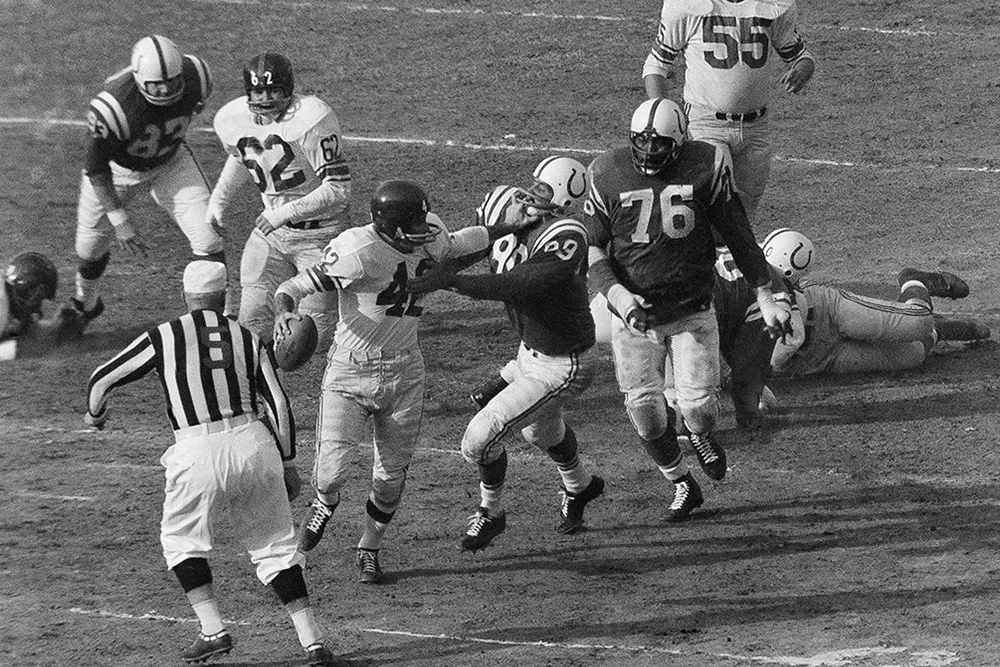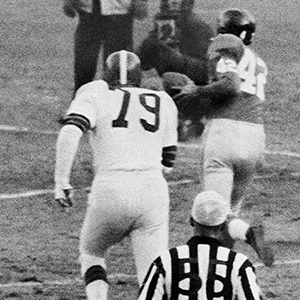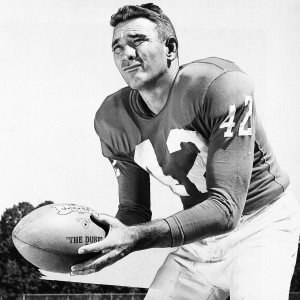Analysis: Charlie Conerly’s giant accomplishments hold up as eras pass
Special to the Pro Football Hall of Fame
(Editor’s note: This article is the first in a series looking at quarterbacks’ achievements that have aged well over the past 80 NFL seasons.)
"Charlie is the best player not in the Pro Football Hall of Fame. He has better numbers than some quarterbacks who are there."
— Wellington Mara
In the 1950s, Giants quarterback Charlie Conerly was one of the biggest names in professional football. He played in four NFL championship games (1956, 1958, 1959, 1961), brought New York its first title in 18 years, threw a lot of touchdown passes, broke records, played until the age of 40, and for all intents and purposes, rode off into the sunset.
He played in an era stacked with some of the greatest quarterback talent in pro football history: Johnny Unitas, Otto Graham, Y.A. Tittle, Norm Van Brocklin and Bobby Layne – all of whom eventually found their way to Canton, Ohio.
As the decades passed, Conerly’s legacy found itself relegated to the throne of footnotes. Fans from his era remember him fondly, but most fans from today’s generation might not be familiar with his career at all. That needs to change.
Conerly was the other quarterback, the one not named Unitas, competing in "Greatest Game Ever Played.”
If that's all you ever knew about Charlie Conerly, you've missed out.
Though, in fairness, some of his greatest accomplishments did take some digging to find.
What you might not know:
- Conerly took over a New York Giants team that finished 2-8-2 prior to his arrival.
- Conerly arguably posted the greatest rookie passing season of any generation in all of pro football history (1948).
- Conerly recorded the highest single-season passer rating at age 38+ in NFL history – a record that stood for 50 years.
- Conerly had a higher winning percentage than 16 current Hall of Fame quarterbacks.
- Conerly recorded the highest passer rating in NFL Championship Game/Super Bowl history (minimum 10 attempts) with a 152.1 in the 1956 NFL Championship game.
- Conerly recorded the second highest passer rating – in defeat – in NFL Championship Game/Super Bowl history (minimum 10 attempts) with his 137.5 rating in the 1958 NFL Championship game. (Matt Ryan is No. 1 at 144.1 in Super Bowl LI.)
Several reasons demonstrate why Conerly deserves consideration for enshrinement into the Pro Football Hall of Fame. (He is a nominee in the Seniors category for the Class of 2024.)
NFL Championship Game performance
Since 1933, the NFL has held a total of 89 championship games.
- Highest passer rating in victory: 152.1 (Conerly in the 1956 NFL Championship game)
- Second highest passer rating in defeat: 137.5 (Conerly in the 1958 NFL Championship game)
Though the storied recollection of Unitas-to-Berry in the 1958 NFL Championship Game leads many to conclude the better quarterback won that night, there’s an argument to be made that Conerly turned in the better game.
The Colts finished the 1958 regular season ranked No. 1 in passer rating allowed by a considerable margin (35.1). The Giants defense finished No. 2 (52.3). Both were great pass defenses, but nothing in the NFL was comparable to a Colts defense that allowed only nine touchdown passes to 35 interceptions in a 12-game regular season. Conerly was near-perfect on the championship stage against one of professional football’s all-time great pass defenses.
Unitas: 26 of 40 (65.0%) for 349 yards (8.7 YPA), 1 touchdown, 1 interception, 90.5 passer rating.
Conerly: 10 of 14 (71.4%) for 187 yards (13.4 YPA), 1 touchdown, 0 interceptions, 137.5 passer rating
Production

When Conerly retired after 1961, his 173 career touchdown passes ranked third in NFL history –trailing only Sammy Baugh and Bobby Layne (both Hall of Famers), tied with Norm Van Brocklin (Hall of Famer) and ahead of Sid Luckman (Hall of Famer).
Had Conerly's professional debut not been delayed by three years due to his service in World War II, he almost certainly would have retired as the NFL's all-time leader in touchdown passes. His 173 career touchdown passes were only 14 away from Baugh’s then-record of 187.
Rookie season for the ages
As a rookie in 1948, Conerly joined a Giants team that had the worst record in professional football prior to his arrival: 2-8-2 in 1947.He would go on to set NFL rookie records for most touchdown passes, most passing yards, highest completion percentage and highest passer rating.
"I've never been big on individual records, but the fact that record was held so long by Charlie Conerly, that's a special thing."
— Peyton Manning
Conerly’s rookie completion percentage record (54.2% in 1948) stood for eight seasons, eventually broken by Johnny Unitas in 1956 (55.6%)
Conerly's rookie passer rating record (84.0 in 1948) stood for 35 years, eventually broken by Dan Marino in 1983 (96.0).
Conerly's rookie touchdown pass record (22 in 1948) stood for 50 years, eventually broken by Peyton Manning in 1998 (26).
While Manning finished his rookie season with 26 touchdown passes, Conerly threw 22 during a 12-game regular season. Conerly's rate of production (1.83 touchdown passes per-game) would amount to 31.1 touchdown passes over a modern 17-game season. Conerly also rushed for five touchdowns as a rookie, bringing his combined passing/rushing touchdown rate to 2.25 per-game, which would amount to 38.3 combined touchdowns over a 17-game season.
Could you imagine a rookie quarterback averaging 2.25 total touchdowns per-game (38.3 over a 17-game season) even with today’s rules and the inflation of modern passing numbers? The Josh Allens, Joe Burrows and Trevor Lawrences of recent years haven’t come anywhere close.
No quarterback since Conerly has set the rookie marks for touchdown passes, passing yards, completion percentage and passer rating.
Greatness at age 38
 In 1959, Conerly recorded what was, at the time, the third highest single-season passer rating in NFL history (minimum 150 attempts): 102.7.
In 1959, Conerly recorded what was, at the time, the third highest single-season passer rating in NFL history (minimum 150 attempts): 102.7.Unitas won AP MVP honors after throwing a then-record 32 touchdown passes, but Conerly's passer rating was 10.7 points higher than Unitas’ 92.0. Conerly was 38 years old, and it would take 50 years for a quarterback age 38 or older to eclipse his mark. (Brett Favre, 107.2 in 2009.)
Ageless excellence
At the time of Conerly's retirement, only one other quarterback in NFL history had thrown a touchdown pass beyond the age of 38: Sammy Baugh, who threw two. Conerly threw 29.Although his role had been greatly reduced by his final season, Conerly stepped up for the Giants in relief of Y.A. Tittle on Dec. 10, 1961 with a three touchdown, zero interception, 129.2 passer rating work of art. The 28-24 win knocked off the Philadelphia Eagles, gave the Giants the NFL’s East Division crown and granting the Giants a birth in the 1961 NFL Championship Game.
Winning percentage
Conerly maintained a higher career winning percentage than 16 Hall of Fame quarterbacks.| Player | Record | Pct. |
| Charlie Conerly | (57-31-1) | .647 |
| Jim Kelly | (101-59) | .631 |
| Norm Van Brocklin | (61-36-4) | .628 |
| Bobby Layne | (80-48-4) | .625 |
| Brett Favre | (186-112) | .624 |
| Len Dawson | (94-57-8) | .622 |
| Bob Griese | (92-56-3) | .621 |
| Dan Marino | (147-93) | .612 |
| Y.A. Tittle | (78-50-5) | .609 |
| Kurt Warner | (67-49) | .577 |
| Troy Aikman | (94-71) | .569 |
| Fran Tarkenton | (124-109-6) | .532 |
| Dan Fouts | (86-84-1) | .505 |
| Warren Moon | (102-101) | .502 |
| Joe Namath | (62-63-4) | .496 |
| Sonny Jurgensen | (69-71-7) | .492 |
Conerly recorded eight winning seasons (1950-52, 1954, 1957-1960), a number that would have been nine had he been credited as the starter during the Giants 8-3-1 run in 1956 using two quarterbacks. His winning percentage also would jump to 0.656.
Conerly recorded eight winning seasons (1950-52, 1954, 1957-1960), a number that would have been nine had he been credited as the starter during the Giants 8-3-1 run in 1956 using two quarterbacks. His winning percentage also would jump to 0.656.
Conclusion
"For the life of me, I can't figure it out ... I've campaigned for him myself and I think (Conerly not being in the Hall of Fame) it's wrong."
— Frank Gifford
Conerly’s production is Hall of Fame worthy, his efficiency is Hall of Fame worthy, his winning percentage is Hall of Fame worthy, his performance in championship games is Hall of Fame worthy, his rookie season might have been the best in NFL history and his performance at the age of 38 might be even more impressive than what Favre, Manning, Brady and Brees were able to accomplish with modern training and modern rules protecting quarterbacks better.
What more should fans realistically expect from a Hall of Famer?
Take over the worst team in pro football and produce one of the greatest rookie quarterback seasons in history: Check.
Excel, not just as a young rookie but as a 38- to 40-year-old veteran in an era before modern training techniques: Check.
Win nearly 65% of the games he started, regardless of head coach or roster: Check.
Retire 14 touchdown passes away from breaking pro football’s equivalent of Major League Baseball’s all-time home run record, missing out only because of service in World War II for three years: Check.
Dominate on the championship game stage and become a champion: Check and check.
Ryan Michael is statistician, sportswriter and contributor to the Pro Football Hall of Fame. You can follow him on Twitter: @theryanmichael
This article is the first of a multi-part series highlighting noteworthy quarterback play over the past 80 seasons. Information from Pro-Football-Reference.com’s database, including its “Play Index Tools,” helped make this research possible.
Next in the series: Michael and Dianne Tittle De Laet discuss Y.A. Tittle’s record-breaking run with the New York Giants from 1961 to 1964.
More of this series
- Analysis: Charlie Conerly’s giant accomplishments hold up as eras pass
- Y.A. Tittle’s journey from San Francisco to New York
- Analysis: An appreciation of Sammy Baugh’s historic 1943 season
- Legendary seasons for Sid Luckman, Peyton Manning separated by 70 years
- Looking back at TB12’s historic 2011 season 12 years later
- Russell Wilson’s decade of dominance in Seattle remains elite
- Roger Staubach’s 1971: The greatest season you’ve never heard about
- Silver anniversary: Randall Cunningham’s solid gold season with Vikings
- 50 years since Unitas’ last pass: Some things you might not know about No. 19
- Race to the top: Brady’s battle with Brees for the NFL’s most hallowed record
- Analysis: Did Andrew Luck exceed hype or fall short?
- Silver anniversary of John’s Elway’s sterling final game
- As cold as ice: Perception of Matt Ryan’s legacy after ‘28-3’
- Cam Newton leads high-flying 2015 Carolina Panthers
Pro Football Hall of Fame Class of 1978 celebrates 45-year anniversary
On July 29, 1978, five decorated individuals were enshrined in Canton, Ohio, forever cementing their legacies among the greatest of the game. The Class of 1978, celebrating its 45th anniversary this year, had ties in professional football dating to 1936.
Pro Football Hall of Fame Class of 1973 celebrates 50-year anniversary
Ten years after the Pro Football Hall of Fame opened its doors, three remarkable professional football players were enshrined into the Pro Football Hall of Fame on July 28, 1973.

